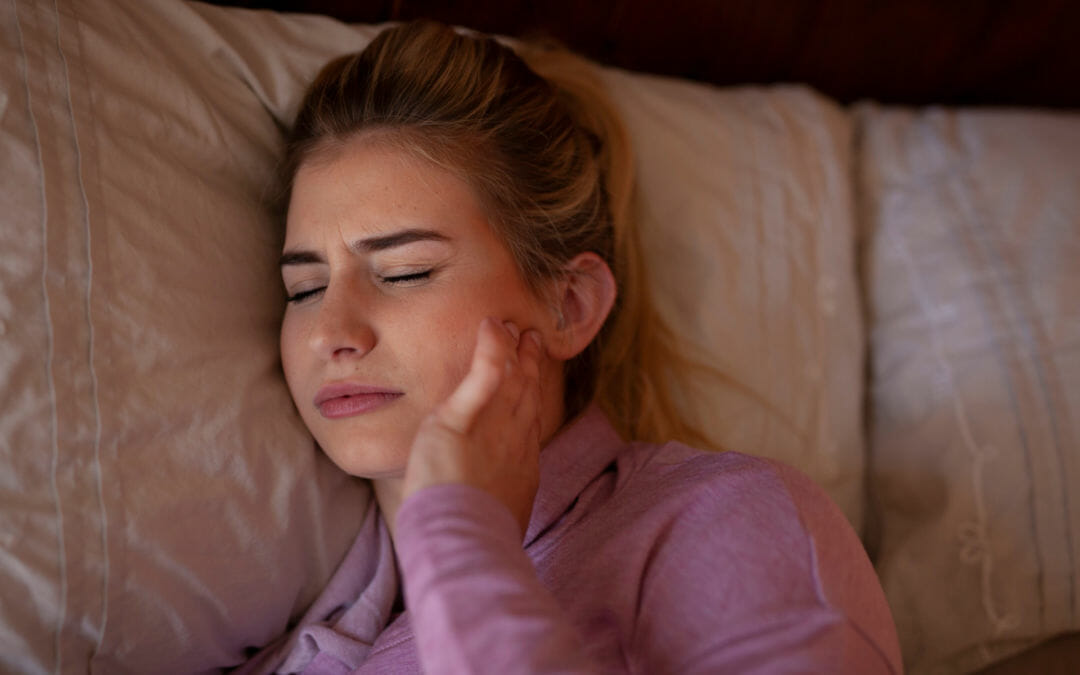When it comes to dental issues, it’s not always easy to guess what’s going on. There are many minor symptoms of trouble with your jaw and teeth that can sneak up on you unless you pay attention. Noticing minor symptoms of teeth grinding allows you to get prompt treatment. Without proper care, your teeth and jaw can suffer permanent damage that requires surgical repair. Getting early treatment and a good mouthguard will prevent further and future issues. Don’t wait until your dentist warns you that they’re seeing signs of wear and grinding on your molars. Watch for these earlier signs of teeth grinding to know when it’s time to make an appointment with us here at Eastgate Dental Excellence.
Stiff Neck and Shoulders
One of the earliest signs to set in after you begin grinding your teeth at night is simple stiffness in the neck and shoulders. Grinding your teeth requires these muscles to move the jaw, even if you can’t realize you’re doing the action. It only takes a little grinding at night while you sleep for your neck and shoulders to become stiffened. If you’re experiencing primarily daytime grinding instead, the pain may be focused on your main jaw joints and your upper neck instead. This is because different muscles are activated by grinding when you’re sitting up rather than lying in bed.
Tightness in the Jaw
When you yawn and stretch your jaw, do you notice any tightness or sudden sharp pains in the back of it? This could be an early indicator you’re grinding your teeth at night or during the day. Just like soreness and tightness in the neck and shoulders, this is due to the overuse of the muscles running along the jaw. Soreness in the jaw tends to indicate a wide range of issues with the temporomandibular joint, but it’s mostly linked to tooth grinding. It’s particularly likely to be the cause when there’s tightness or stiffness in the jaw as well. See your dentist if you experience tightness or a lack of range of motion in the jaw at any time since it could also be a sign of infection in the jaw or issues with an impacted wisdom tooth.
Sore Molars
Molars can become sore from a wide range of issues, but tooth grinding is a common cause. If you can rule out ear infections, impacted wisdom teeth, and infections, you’re likely experiencing grinding that’s leading to soreness. It’s the constant pressure that occurs during grinding that puts stress on the tooth roots and affects the nerves there. In fact, grinding your teeth for long enough can leave almost all of them sensitive to cold or hot temperatures due to the wearing away of enamel. See your dentist promptly if any of your teeth are sore to determine the root cause and solve it before it grows into a bigger problem.
Ear Discomfort with No Infection
Most people assume that any pressure, pain, or discomfort in their ears is due to an infection. However, issues with your jaw and back teeth can also lead to pain in the ears because all of the nerves in this area run closely together. Ending your grinding habits can surprisingly lead to reduced pain, popping, and pressure in the ears. While you might want to see an ear, nose, and throat specialist first to rule out any ear canal issues, see a dentist next to see if tooth grinding is the issue that’s referring the pain into the rest of your head.
Clicking Noises
Your jaw shouldn’t click when you open or shut it. You may experience this as a distinct sound that others can hear, or only as a popping sensation that occurs somewhere in the joint of your jaw. This is a side effect of stress on the temporomandibular joint, swelling the cartilage there and causing it to operate differently. Only treating the grinding issue will stop the clicking and lead to reduced issues with your jaw. If you ignore the clicking because it’s just a mild sound or sensation, you’re likely to experience stiffness and soreness instead.
Anxiety and Stress
Both chronic stress and anxiety issues are the root causes of tooth grinding. While you may not automatically start grinding your teeth because you’re stressed out, you should watch for other signs when experiencing more anxiety than usual. Visiting your dentist at least once during your periods of high stress can rule out if you’re doing any nighttime teeth grinding without realizing it. You can also discuss options for dealing with your stress without damaging your teeth with the dentist and get tips on staying healthy when life is throwing challenges at you.
Difficulty Sleeping
When you’re grinding your teeth at night, you’re likely also not sleeping very deeply. It’s often a problem that accompanies insomnia, midnight waking, and similar sleep disruption issues. Just the fact that you’re moving and stressing your jaw while trying to sleep will reduce how well-rested you feel in the morning. Address your sleep issues as soon as possible while seeing your dentist treat the tooth grinding to restore how restful your nighttime routine is once again.
Protect your teeth from the hidden risk of grinding damage by scheduling an appointment with us here at Eastgate Dental Excellence. We can quickly determine if you have any signs of wear on your teeth and recommend a treatment plan to prevent any further damage. Let us help you with treatments like custom-fitted night guards to ensure you don’t experience any further symptoms from this common problem.

